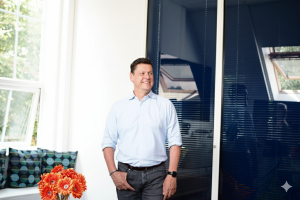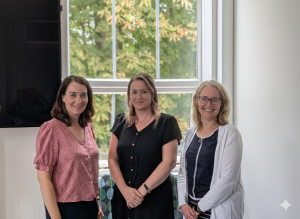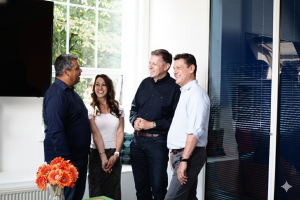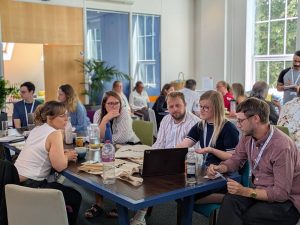Neurodiversity care in the UK is at a pivotal point. Rising demand, long waiting times and fragmented service offerings for assessment, diagnosis, and support mean we are operating within a system that doesn’t really meet the needs of neurodivergent children and young people or adults. Existing approaches are predominantly reactive and focused on assessments.
It begs the question: Should we be looking to shift to a system that is more proactive, person-centred and technology-enabled?
Through our discussions with experts across many areas of the neurodiversity sector, several key themes have emerged. These helps us to see how the future of neurodiversity support could look. From these conversations, one thing is clear: technology can help close the gap and provide greater support for more people.

Thoughts from Reece Donovan, our CEO:
The progress we have made in neurodiversity this year is really encouraging. We have welcomed multiple new customers.within NHS, private and university settings. After several years of extensive research and discussions with other digital suppliers, services, service users and academic researchers, we are well positioned to expand further in 2026 and beyond. The secret to truly exceptional software really does rely on partnerships and collaboration, which we’ll continue to build upon.
Addressing demand, delay and disconnect
Ross O’Brien, Founder of XRHA, explains that services supporting people with neurodevelopmental conditions have been facing a perfect storm. This is due to rising referrals, longer wait times, increasing need for assessment and support, and significant underfunding and underresourcing.
Waiting times for autism and ADHD assessments are months, and in some cases years. Time frames that are way beyond the NICE recommended guidelines. This leaves individuals stuck in limbo, and without access to adequate support. Additionally, funding challenges, particularly high assessment costs are creating an inevitable gap, leaving little to no funding for tailored mental health support.
Jo Black, founder of The ND Harbour, discussed the shortage of clinicians trained in differential diagnosis. She also explained that funding models prioritise initial assessments over long term support. This results in a system where many individuals are falling through the cracks and not getting the support they need. People are experiencing significant delays, not only in getting a diagnosis but also in accessing the care they need to thrive in their environment.
Rethinking frameworks: from diagnosis to needs-led
The traditional frameworks we are currently operating within prioritise a diagnosis, with overwhelmed services unable to provide ongoing support. Plus, the mental health needs of neurodivergent individuals are often overlooked, due to the complex overlap between neurodivergent traits and mental health needs. Eleanor Norman, Head of Growth and Service Development at Xyla adds to this, saying that symptom overlap can actually complicate diagnoses, and can therefore, add to overall demand for neurodiversity services.
Emma Mander, CEO of Great Minds Together, highlighted the need for us to develop flexible, needs-led frameworks that go beyond regulatory checklists. These should focus on the whole person, and include consideration of their educational, social and emotional context. Abigail Downer of Acacium Group agrees, and suggests that the current system does not make it easy for people to receive continued care. Only with holistic consideration of needs and contexts can we truly provide the best support to the individual. By shifting the emphasis from solely diagnosis to a consideration of the whole individual and their environment, services can provide more impactful interventions that are timely and appropriate.

Bridging the knowledge gap
Despite the growing level of awareness of neurodiversity in recent years, significant knowledge gaps still exist within the healthcare system. Clinicians and educators can lack an up to date understanding of neurodivergent conditions. This often results in inconsistent provision of care, and variable outcomes.
Matt Williams, from Health Innovation Oxford and Thames Valley, emphasises the importance of continuous professional development, as well as the creation of psychologically safe spaces for discussion. When professionals are able to feel confident in their understanding of the intersections between neurodiversity and mental health, they can deliver care that is more empathetic, accurate and tailored to the unique needs of neurodivergent individuals.
Influence of social media on neurodiversity awareness
In today’s world, social media plays a huge role, even when it comes to health and care. Some of our experts raised the importance of social media in neurodiversity. Abigail Downer told us how social media has helped create a safe and accepting space, where a neurodiversity diagnosis is not seen as limiting. Blandine French, Autism and ADHD researcher and part of the ADHD Taskforce agrees, saying that neurodiversity is starting to become less stigmatising through the use of social media, particularly TikTok videos that are spreading awareness and promoting positivity.
Blandine also explained how social media support groups allow signposting to the right platforms and resources. This increases peer support, and helps clients to stay well whilst waiting.
Awareness and acceptance of neurodivergence is still not where it needs to be. However, social media can be used in a positive light to help remove stigma and improve overall understanding of neurodiversity.

Prioritising a person centred approach to neurodiversity services
Lived experience is at the core of effective neurodiversity services. Abigail Downer from Acacium Group showed us the value of integrating personal preferences, goals and perspectives into the design of neurodiversity services.
When we apply standard protocols to everyone, interventions are not always accurate or appropriate. Instead, by providing interventions that are meaningful, you can create an environment where the individual feels empowered and supported. This allows long term outcomes to be more positive.
Harnessing technology to enhance service delivery
Technology is widely recognised as a powerful force for positive change. All of our experts agree on its potential to transform neurodiversity services. Emma Mander highlighted that technology embodies a growth mindset. If services adopt a similar approach, some of the longstanding challenges in the sector can be tackled, empowering meaningful change.
Jo Black emphasised how technology can streamline processes and support staff in managing the pressures they face daily, while Matt Williams reminded us of the importance of balancing human interaction with technological support, noting that technology can provide practical solutions for clinicians and clients alike.
Eleanor Norman added that technology can increase accessibility by enabling assessments from the comfort of clients’ own homes, helping to reduce waiting lists and support both diagnostic and post-diagnostic processes. Finally, Matthew Punter, founder of EDEN, and Dr Philippa Kindon, our Neurodiversity Champion, reflected on how technology can act as a catalyst for broader transformation within neurodiversity services.
Together, these insights illustrate that technology is not only a tool for efficiency and accessibility but also a driver of innovation, supporting both professionals and clients across the neurodiversity sector.

iaptus can help
As highlighted by Jo Black, high quality reporting is crucial, particularly when it comes to seeking funding. She says, “The care pathway feature within iaptus is not paralleled in any other patient record system that I’ve worked with,” demonstrating how tools like iaptus can transform neurodiversity services. She adds, “The level of detail you can have within the care pathway is invaluable. You can fix it to dates, add notes, see when someone enters the care pathway and analyse the data when someone moves between pathway stages.”
Abigail Downer explains how the implementation of iaptus into their neurodiversity services has helped transform their service: “Without a patient administration system, our service quite simply could not run and we would be open to so many risks by using a more paper-based system”.
iaptus supports neurodiversity services by providing integrated digital solutions that streamline processes, enhance accessibility, and empower clinicians to deliver more efficient and personalised care.
To find out more about how iaptus can support your service, get in touch.
The future of neurodiversity services…
From all of the insights our experts have provided, it is clear that the current system is facing significant challenges. However it is not beyond repair. Health, care and education all need to work together to transform the sector and improve outcomes. The future of neurodiversity support isn’t just about faster diagnoses. It’s about a total shift in perspective – one that is person-centred, needs-led, and digitally empowered.
At Mayden, we are now motivated to expand our product portfolio, with the aim to add even more value to the services we support. We will continue to focus our attention on this important market, finding ways to help services reduce waiting lists, improve efficiency and reduce work stress through the use of our software.
View our whole thought leadership series here. If you’d like to take part in future articles, please contact events@mayden.co.uk.


